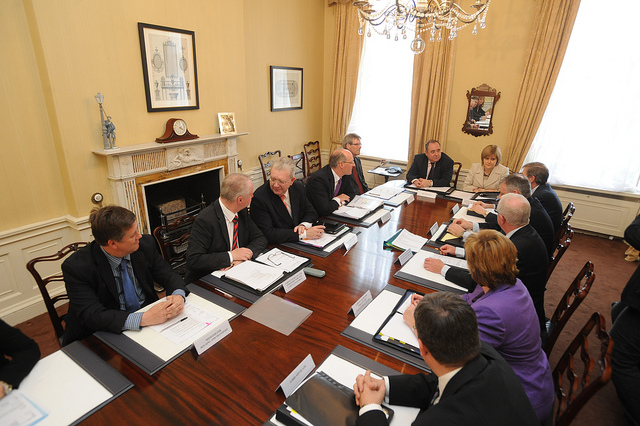Debating Scotland’s transition costs: A response to Iain McLean’s critique
Iain McLean’s welcome comments can help us to see more clearly where some real uncertainties lie, says Patrick Dunleavy. Underneath the flim-flam of debate, the scope of debate about transition costs has focused down.
I am very grateful to Iain McLean for responding critically and perceptively to our reportabout the possible transition costs for Scotland in the event of Yes vote in the referendum with his clear and interesting comments. Both of us clearly believe that voters in Scotland should have the best possible basis for making their decision, and Iain’s querying of our analysis is very helpful in further exploring and clarifying the issues involved.
I guess it would be most helpful for readers at this stage to highlight what are the key differences between Iain’s view and mine, and to show how they might be reconciled, which is what my Table 1 below does, for each component of the costs in dispute. It also shows how we can reconcile the apparent differences between us.
Table 1: Key differences between the Dunleavy and McLean views of Scotland’s transition costs, and how they might be reconciled
| Type of cost | Dunleavy view (PD) | McLean view (McL) | Reconciliation |
| Initial set-up costs £200 million | Based on study of Whitehall reorganizations and detailed analysis of list of UK bodies affected | McL is sceptical – but upon what basis is unclear. The Scottish Office Secretary accepted these numbers on TV, saying he had no rival numbers to offer. | There is always room for uncertainty in cost estimating – but generally some numbers are better than no numbers |
| Disentangling costs | Borne by both Scotland and rUK. Scotland’s share could be ½ to 1/12 (population share) depending wholly on negotiations |
Argues that these are also set-up costs. Quotes UK Treasury extrapolating high disentangling costs – basis unclear. Silent on share of cost allocated to Scotland | This is a dispute about language. |
| Streamlining savings | Mentioned – previous intra-UK reorganizations have generated substantial savings | Ignored | This is a scope difference |
| Transition costs from inter-governmental agreement or contracting between Scotland and rUK | Points out some (modest) additional costs will accrue here and says that contracting would be most expensive option. Depends on negotiations | Says that PD ignores these costs | Mistake by McL |
| Cost to Scotland of gaining full control of its own tax system by 2020s, replacing old, complex ‘legacy’ IT with modern systems | Says Treasury published informal estimate of £500 million is not based on any careful analysis, but is ‘not implausible’. This number has no provenance and there is no detail behind the guesstimate. Costs will depend a lot on negotiations | Presumably accepts Treasury number? Argues that no reinvestment cost would be needed without Scottish independence having taken place, so full amount = ‘set up’ cost. Silent on negotiations. | This is a dispute about language. |
| Cost to Scotland of gaining full control of its own benefits system by 2018, replacing old, complex ‘legacy’ IT with modern systems | Says Treasury published but informal estimate of £400m is not based on any careful analysis, but is ‘not implausible’. This number has no provenance and there is no detail behind the guesstimate. Costs will depend a lot on negotiations | Presumably accepts Treasury number? Argues that no reinvestment cost would be needed without Scottish independence having taken place, so full amount = ‘set up’ cost. Silent on negotiations. | This is a dispute about language. |
| Policy savings | Discussed | Not mentioned | This is a scope difference |
| Asset transfers | Discussed – warning that any sums received for unfixed or overseas assets should not be thought of as offsetting transition costs, but as part of Scotland’s public equity backing up borrowing | Not mentioned | This is a scope difference |
In addition, going beyond our report, Iain’s comment introduces an extensive discussion of two reports from ICAS (the Institute of Chartered Accountants for Scotland) dwelling on the issues involved in the transition of the taxation system. I summarize our different views of the relevance and quality of these reports below in Table 2.
Table 2: Different views of two ICAS reports
| ICAS report | Dunleavy view (PD) | McLean view (McL) | Reconciliation |
| The tax implications of Scottish independence or further devolution | Discussed briefly. PD says: “ICAS have produced a long academic report dwelling in a rather vague way on the complexities of running a tax system. But with a stable UK tax regime in place in the country for many decades, and plenty of strong expertise for the Scottish government to draw on, there seems every reason to believe that Scotland’s revenue stream will continue as before. Indeed ‘tax morale’ (the willingness of citizens or businesses to pay taxes) is likely to rise after independence.” | Unclear | This is a commissioned report from a set of English law academics, covering both independence anddevo max changes. There are actually no transition cost numbers at all given in this report. We agree that it sets out the well-known (and perfectly general) issues that shape whether a tax system runs successfully or not. |
| ICAS, Scotland’s tax future;Taxes explainedPress release | Not mentioned because: |
a. ICAS number is 50 per cent more than Treasury number
b. The ICAS number actually has no relevant provenance – it is a number taken from New Zealand costs for a different reform, and is not based on any discernible specific analysis of Scotland’s situation.
c. The NZ reform referred to actually introduced a Mirrlees-type tax system there. ICAS says that the Scottish government has indicated a willingness to go down a Mirrlees optimal reform route. But no such policy decisions have been made by any Scottish government at this time. If they were made, in the five years following another general election and a new government’s formation, Scotland would be buying a wholly reformed tax system, not a replacement system. Ergo these costs cannot conceivably be represented as set-up costs.Assigns strong credence to ICAS number on the basis of trusting Scottish accountants generally. He does not explain why the Treasury number above (that he also accepts) is so much less than this.It would be good to know what number Ian is actually advocating – currently his two endorsed numbers are very far apart.
Note: The 2011 Mirrlees Report was to the UK government (named after economist James Mirrlees). It set out moves to bring the UK tax system closer to economists’ idea of an optimal tax system, see here. A complete and thorough-going reform, designed to last for generations, it has not yet been implemented.
Where does this leave us on estimating the total transition costs that Scotland would face? Table 3 gives a summary view and shows how the different positions that Iain and I take can be reconciled.
Table 3: Differing views of Scotland’s total transition costs estimates
| Dunleavy view (PD) | McLean view (McL) | Reconciliation |
| £200 million immediately, + Scottish share of disentangling costs, + investments costs for tax and benefits back office of perhaps as much as £900 million, minus streamlining savings, minus policy costs.If we count roughly half of investment costs as necessitated by independence then net transition costs would be less than £650 million | At least £200 million immediately, + Scottish share of disentangling costs, + alleged further ‘set-up’ costs for tax and benefits back office of £900 million to £1,150 million. Total transition costs of up to £1.5 million | The Treasury quoted a review study by Prof Robert Young of Canada saying that government transition costs could reach 1.1 per cent of GDP. On this basis the Treasury and Danny Alexander have repeatedly stressedtransition costs of £1.5 billion costs as the UK government’s key estimate. However, Professor Young has himself disowned this interpretation of his work. He has stressed thatthe estimates he reviewed lie on a range. The bottom of this range was 0.4 per cent of GDP, about £600 million for Scotland. |
Iain does a good job of essentially restating, almost word for word, the UK government’s position. He also endorses (in his usual agreeable and folksy way) the unionist campaign’s highly contentious use of the language of ‘set up costs’, but he does recognize the difficulties of cost estimation.
It is interesting to note in this context that a main reason why costs numbers are currently hard to estimate is that Whitehall has been completely forbidden by ministers from calculating any detailed transition costs for Scotland, in case some numbers get written down that could be FoI-ed and then undermine the ‘Better Together’ campaign. Equally civil servants have been banned from even discussing any of the transition details in advance with Scottish government staff. To my knowledge, the only London body that has had any more detailed discussion with Edinburgh is the Bank of England (which is independent of ministers). Compare this treatment with the civil service briefings normally given to all parties before a UK general election. Why should the far more important issues around possible independence be left for Scottish voters to conjecture about like this, when detailed answers could easily be made available either by Whitehall or by academics commissioned to inform the debate?
Conclusions
Overall, however, I welcome the fact that behind some debating points in Iain’s piece that I don’t want to engage with, Table 3 shows that the scope for discussion about transition costs has clearly focused down. Scotland’s voters can be relatively sure that total transition costs over a decade will lie in a restricted range, from 0.4 of one per cent of GDP (£600 million), up to a maximum of 1.1 per cent (£1,500 milion). This is a step forward in debate and I am grateful to Iain for helping to bring it out.
In place of the earlier atmosphere of dread about transition that was being encouraged by some unionist statements, perhaps both sides in Scotland debates can now ‘lighten up a wee bit’ about transition costs – and debate instead the real issues of principles, values and future choices that separate them.
—
This blog is a response to Iain McLean’s critique of Patrick Dunleavy’s recent report, ‘Transitioning to a new Scottish state‘. Both Iain and Patrick will be participating in an event on July 1st at the LSE, ‘Scotland and England: what future for the union?‘.
Note: This article gives the views of the author, and not the position of Democratic Audit, nor of the London School of Economics. It also appears on the LSE Politics and Policy blog. Please read our comments policy before posting.
—
 Patrick Dunleavy is Co-Director of Democratic Audit, Chair of the LSE Public Policy Group, and a Professor of Political Science at the LSE.
Patrick Dunleavy is Co-Director of Democratic Audit, Chair of the LSE Public Policy Group, and a Professor of Political Science at the LSE.






 Democratic Audit's core funding is provided by the Joseph Rowntree Charitable Trust. Additional funding is provided by the London School of Economics.
Democratic Audit's core funding is provided by the Joseph Rowntree Charitable Trust. Additional funding is provided by the London School of Economics.
Clarity on Set up costs
Debating Scotland’s transition costs: A response to Iain McLean’s critique https://t.co/JgYk3cETDw
#indyref
#indyref the scope of debate about transition costs has focused down. Thanks to @PJDunleavy wheat from chaff.
https://t.co/MXna7ULF7n
@DavidFalconsm @IanIwrussell @cjl8652 https://t.co/TTq21y3iNe
@GrinBins Don’t say i’m not good to you. https://t.co/HRCTAEpJ0s
Something you won’t see on the @BBCNews or @BBCScotland.
https://t.co/3Wa4IJiPMd
Patrick Dunleavy: Debating Scotland’s transition costs: A response to Iain McLean’s critique https://t.co/uCGUnt11h5
Debating Scotland’s transition costs: A response to Iain McLean’s critique https://t.co/8fR8Ma0qcH
Debating Scotland’s transition costs: A response to Iain McLean’s critique https://t.co/xaDRBqPlWe